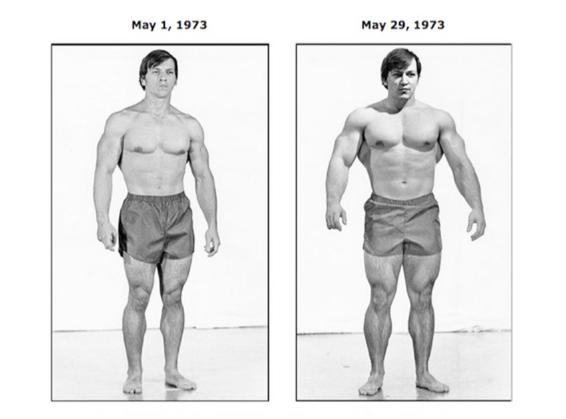A fascinating new study on muscle memory shows that, to paraphrase Tennyson, it’s better to have trained a little and lost, than never to have trained at all. Muscles really do possess a kind of genetic memory that makes them more sensitive to retraining after a period of inactivity.
The results of the famous Colorado Experiment, when Casey Viator, after a long layoff, gained 60lbs in a month using Arthur Jones’s high-intensity training techniques
Muscle Memory study
A particular kind of muscle memory is a perennial subject of interest in the fitness world. If you gain and then lose muscle, will you get it back quicker if you start training again? Many think so, and with good reason.
One of the most famous experiments in bodybuilding history, the 1973 Colorado Experiment, put this phenomenon on amazing display, when Casey Viator gained 60lbs of muscle in a single month using Arthur Jones’s high-intensity training techniques. Although Jones used the experiment as an advertisement for his training system, critics pointed to the fact that Viator was not a novice but already an accomplished bodybuilder who was coming off a long layoff due to injury. He was, they claimed, mainly gaining back muscle he had lost.
Although few would doubt that the phenomenon actually exists, until now there has been little evidence of how it actually works. Now a new study, from the University of Arkansas, is revealing precisely that.
The team at Arkansas University, under Kevin Murach, revealed that the DNA of trained muscle cells in mice retains a kind of ‘genetic memory’ which allows rapid re-gaining of muscle after periods of inactivity.
The mice were trained on a progressively weighted wheel over a period of 8 weeks to build muscles, then taken off the wheel for a 12 week period of “detraining.”
After the detraining, the mice were then ‘retained’ for a period of four weeks. Next these mice were compared with a control group that had only trained for four weeks.
The findings showed that the previously trained mice experienced accelerated gains in muscle growth after retraining when compared to the control group, and that specific epigenetic changes to DNA methylation – i.e. changes to the way the genetic code actually works – persisted after the original training.
The term ‘muscle memory’ is often used to describe the retention of motor skills after ceasing training – for instance, still being able to play the guitar years after giving it up – but the results of this study suggest that the long-term effects run much deeper than just the nervous system. Information may actually be retained at the cellular level in trained individuals, ready to be reactivated as soon as training recommences.
Murach explains, “Epigenetics is the idea of changing how a cell responds to stimuli (i.e., alters the expression of genes) without altering the genetic code. Cells can respond to things based on DNA without changing the DNA, just changing how it’s accessed. You can change the cellular response without changing the genetic code.
“Understanding the cues that enhance muscle adaptability, specifically those at the epigenetic level, has consequences for healthy gymgoers and athletes, as well as populations susceptible to muscle dysfunction, such as those forced into inactivity as well as aged individuals.”
The results chime with another new study we covered recently, which showed that even six weeks of training resulted in epigenetic changes associated with reduced susceptibility to a wide variety of harmful diseases.
Ultimately, it’s becoming clear, as Murach himself puts it, that ‘it’s better to have worked out and lost muscle, than to have not worked out at all.’

Don’t hesitate to email us at [email protected] for personalized coaching and a client questionnaire if you’d like DEDICATED tailor-made personal training on strength training, building muscle, losing fat, developing athleticism, and more — all to your liking, lifestyle, habits, and taste!
Otherwise, don’t forget to claim your FREE eBook detailing how to lose 20lb of fat while building muscle in 12 weeks! You can claim it here.
Alternatively, you can pick up a FREE eBook on fundamental strength principles offering an introductory workout program.











